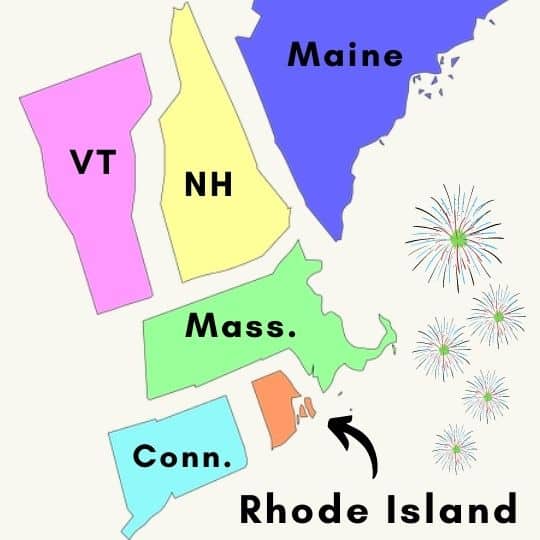Things To Know About Living In Rhode Island Before You Move
Is Rhode Island a good place to live? Let’s examine this question and explore the pros and cons of living in Rhode Island. Discover how Rhode Island’s diverse living experiences, from its vibrant urban centers to its serene small towns, will suit your preferences and lifestyle.
Is Rhode Island A Good Place To Live?
Yes. Rhode Island is an excellent place to live, offering residents a unique coastal lifestyle that is a haven for beachgoers and seafood lovers. Living in Rhode Island means being close to everything, with easy access to picturesque shorelines, vibrant seaside towns, and a bustling cultural scene.
Next, consider today’s full list of pros and cons.
Pros And Cons Of Living In Rhode Island: Side By Side Comparison
| Living in Rhode Island Pros | Living in Rhode Islands Cons |
| 1. Scenic beauty | 10. High cost of living |
| 2. Fantastic beaches | 11. Harsh winter weather |
| 3. Pleasant weather | 12. Overcrowding |
| 4. Vibrant urban living | 13. Bad driving conditions |
| 5. Close-knit communities | 14. No mountains |
| 6. Coastal living options | 15. High income taxes |
| 7. Good schools | 16. Excessive property taxes |
| 8. Close to everything | 17. Costly sales taxes |
| 9. Convenient for travel | 18. More taxes, taxes, taxes |
Now, let’s dive deeper into today’s list to learn more about the pros and cons of living in Rhode Island.

Disclosure: At no cost to you, I may get commissions for purchases made through links in this post.
Living In Rhode Island: The Pros
1. Rhode Island Is Full Of Scenic Beauty And Charm
Rhode Island is a beautiful place to live.
Bordered by the Atlantic Ocean on two sides, the state’s coastline has many exciting elements, including inlets, coves, bays, and beaches.
Charming colonial towns boast cobblestone streets lined with historic architecture along the coast. Inland, you will find the countryside dotted with forest and peaceful farms.
Block Island, a small isle just 10 miles from the mainland, accents the state’s beauty. On its southern shores, there are giant cliffs called the Mohegan Bluffs.
The island has lovely beaches and places for hiking, biking, and exploring along the coast. You will discover a cute downtown with shops, eating places, and art galleries.
Block Island is an excellent place to visit for its stunning views.
2. Beach Lovers Will Enjoy Living In Rhode Island
Rhode Island is blessed with a variety of fantastic beaches.
There are tranquil shores in Narragansett Bay across the water from Massachusetts. At the same time, you can explore the rocky, wide, open ocean shorelines in the far southern region of the state.
Some of the best beaches to visit include…
- Goosewing Beach, Little Compton
- Misquamicut State Beach, Westerly
- Narragansett Town Beach, Narragansett
- Easton’s Beach, Newport
- East Mutunuck Beach, South Kingstown
- Napatree Point Beach, Westerly
- East Beach, Charlestown
3. Rhode Island Has Plenty Of Pleasant Weather
One of the best things about Rhode Island is its spring through fall weather, offering a temperate climate with nearly 200 sunny days yearly.
The climate is perfect for enjoying this state’s great outdoor destinations. Whether biking the trails or strolling the beaches, the pleasant seasonal weather will enhance your experience.
Rhode Island is, therefore, delightful for residents who like to get outside and enjoy the changing seasons.
4. Rhode Island Offers Urban Living Options
Rhode Island’s capital city, Providence, boasts a vibrant urban feel with a cozy small-town vibe. It is walkable and safe, and its historic architecture gives it character.
Residents enjoy the cultural events, lively nightlife, and an impressive entertainment scene. Furthermore, the Rhode Island School of Design houses a renowned art museum featuring a vast collection, a must-visit for art enthusiasts.
5. Small-Town Living In Rhode Island’s Close-Knit Communities

Rhode Island offers an excellent opportunity to experience New England’s small-town lifestyle. Just look beyond Providence to the state’s western border.
There are dozens of serene colonial towns awaiting your arrival. You can immerse yourself in the perks of close-knit community living and enjoy peaceful streets, friendly neighbors, and a relaxed pace of life.
These towns offer a retreat from city hustle while still providing access to essential amenities. Whether it’s local festivals, farmers’ markets, or historic landmarks, small-town Rhode Island living embraces you with its warmth and simplicity, making it an appealing choice for some.
6. Residents Love Living On The Rhode Island Coast
Rhode Island’s ocean shores offer many amazing places to live.
Thus, the state has excellent coastal cities and towns to consider for your new home, including:
- Jamestown
- Charlestown
- Narragansett
- Newport
- Little Compton
7. Living In Rhode Island Means Access To Good Educational Options
Rhode Island school systems and educational opportunities are highly regarded, according to studies done by WalletHub and USA Today.
For K-12, like many states, some school districts are better than others. Good choices for families with school-age children include:
- Barrington
- East Greenwich
- Kingstown
- Cranston
Conversely, many consider the Providence school system to be of lower quality.
Rhode Island has several excellent colleges and universities. The list starts with the prestigious Brown University. Getting accepted into this Ivy League school is a big accomplishment.
Other good schools for higher education in Rhode Island include:
- Rhode Island School of Design
- The University of Rhode Island
- Providence College
- Johnson and Wales University
Across these institutions, you will find excellent programs ranging from culinary arts to sports management, psychology, teacher education, nursing, and more.
8. You Will Be Close To Everything After Moving To Rhode Island

Rhode Island is a small state measuring just 37 miles wide and 48 miles long, according to ri.gov. As a result, it is quick and convenient to travel anywhere in the state in less than an hour.
Thus, you do not have to live by the ocean to enjoy its immense beauty.
For example, you can hike Jerimoth Hill on the state’s western border in the morning and then watch the sunset on the beach of your choice in the afternoon.
As a result, living in Rhode Island means you are always close to the city, beach, countryside, or woods.
9. Your Next Get Away Is Never Far Away
Rhode Island is ideally located for your next getaway. After moving to the state, you will be close to so much the East Coast offers.
For example, Boston is about 60 miles from Providence, and New York City is less than 200. Thus, these major cities are at your doorstep for business or pleasure.
For air travel, Rhode Island T. F. Green International Airport is considered one of the most convenient in the country.
Finally, Providence is connected by high-speed rail to Boston, New York City, Philadelphia, Baltimore, and Washington D.C.
Okay. That concludes the best things about living in Rhode Island.
However, an article about the pros and cons of living in Rhode Island is incomplete without addressing some of the not-so-good things about living here. So, let’s review the cons.
Living In Rhode Island: The Cons
10. The Cost Of Living In Rhode Island Is Higher Than Average

Rhode Island has a high cost of living. Thus, you may discover that your expenses go up after moving here, whether you are buying food, housing, or other necessities to support your new Rhode Island lifestyle.
For example, according to the Missouri Economic Research and Information Center, Rhode Island’s cost of living index is 110.7, compared to 100, the U.S. average.
To save a few bucks, try the Rakuten cash rebate app. We use it to earn money back on all of our online purchases.
11. Rhode Island Experiences Harsh Winter Weather
Rhode Island winters are cold and snowy
First, the state gets about 3 feet of snow annually. That’s significantly higher than most other states in the country.
Second, expect cold temperatures during the peak winter months. Daytime temperatures may not break the freezing point, while overnight readings frequently drop below zero. The inland parts of the state experience the coldest temperatures, while the coastal regions are slightly warmer.
12. Overcrowding Is An Issue In This Tiny Congested State

Rhode Island is a densely populated state. Based on land area, the state is small. Furthermore, much of the state’s land is forested, with few inhabitants.
As a result, the nearly one million residents are concentrated in the Providence metropolitan area and other popular locations along the ocean coast. Putting these features together means there are many people in a small space.
Overcrowding becomes more significant during the summer when tourists flock to the waterfront and beaches.
13. You Will Find Traffic Congestion, Bad Roads, And Lousy Drivers In Rhode Island
Rhode Island has heavy traffic because of the dense population.
Making matters worse, there are plenty of potholes.
Finally, Rhode Island drivers have a bad reputation for tailgating and aggressive, rude driving behaviors.
14. You Won’t Find Mountain Landscapes After Moving To Rhode Island
Rhode Island is scenic, but you will not find mountains for hiking, exploring, and camping. The state has mostly flat to rolling terrain.
Residents must venture into upstate New York, Vermont, or New Hampshire to enjoy the mountains.
15. Income Taxes Will Take A Bite Out Of Your Budget

Rhode Island has a progressive tax system similar to other New England states. That’s a fancy way of saying the more money you make, the higher your state income tax rate.
The highest rate is almost 6%. However, most people will have an average income tax rate of less than that. Everyone’s income tax situation is different. So, consult with your tax advisor before moving to Rhode Island.
However, as a rule of thumb, most people will pay the state 3%-5% of their income to the state in income taxes.
16. Property Taxes Increase Your Cost Of Living In Rhode Island
Rhode Island has high property taxes.
Two factors combine to make the state’s real estate taxes costly. First, Rhode Island’s average property tax rate is one of the highest in the country, and second, the tax rate is applied to high real estate values.
As a result, you will be hard-pressed to find another state where you will pay more in property taxes.
17. The State Has Costly Sales Taxes
Rhode Island imposes costly sales taxes.
Residents pay roughly 7% on purchases to sustain their Rhode Island lifestyle. That’s one of the highest sales tax rates in the country.
18. Taxes, Taxes, And More Taxes
Rhode Island is not tax-friendly to retirees. Retirement income is taxable, and the state has an aggressive estate tax.
Finally, if all these taxes are not enough. There is an annual property tax applied to the value of your automobile.
Okay. That’s a wrap. Allow me to conclude with a few final thoughts…

Living In Rhode Island: Wrap-Up And Resources
I hope this discussion has helped you think about some important questions. For example,
1) Is Rhode Island a nice place to live?
and
2) Why move to Rhode Island?
Perhaps you have decided that the Rhode Island lifestyle is right for you by now, or maybe not. Either way, good luck with your decision, no matter where you decide to move.
More Reading About Where To Live And Why
Author Bio: Tom Scott founded the consulting and coaching firm Dividends Diversify, LLC. He leverages his expertise and decades of experience in goal setting, relocation assistance, and investing for long-term wealth to help clients reach their full potential.
